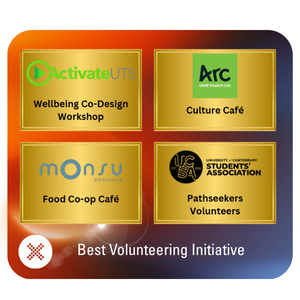
The Session will showcase the Finalists of the Best Volunteering Initiative in the 2025 Student Experience Network Awards.
ActivateUTS – Wellbeing Co-Design Workshop
The ActivateUTS Wellbeing Co-Design Workshop was created to embed authentic student voice into wellbeing programming through a collaborative, student-led design process. Recognising the limitations of traditional feedback methods, the initiative provided a hands-on professional development opportunity where student volunteers worked alongside staff and UTS Counselling to co-create real wellbeing events. Held in January 2025, the four-hour workshop used group activities and design frameworks to identify key wellbeing challenges and develop practical, event-based solutions. The result was two successful student-led initiatives—Budget Bites, addressing food insecurity through accessible cooking sessions, and the UTS Walk Club, promoting social connection and physical wellbeing. Both programs were implemented in the Autumn session and continue into Spring, with strong engagement and volunteer participation. The workshop not only exceeded its KPI of generating one new initiative but also enhanced student satisfaction, with volunteer ratings rising from 8.8 to 9.15 out of 10. Overall, the Wellbeing Co-Design Workshop redefined how ActivateUTS integrates student perspectives—transforming volunteers from contributors to co-creators, while strengthening trust, inclusion, and the impact of wellbeing initiatives.
Arc@UNSW – Culture Cafe
Culture Café, an Arc@UNSW initiative, provides a welcoming, volunteer-led space for international students to connect, share culture, and foster belonging within one of Australia’s most diverse student communities. Running weekly during term, each session explores a different cultural theme through trivia, food, games, and storytelling, creating opportunities for students to celebrate diversity and reduce feelings of isolation. With over 2,655 participants and partnerships with 15 cultural societies between July 2024 and June 2025, the program has become a cornerstone of intercultural engagement on campus. Its volunteer model—comprising 40 students per term—empowers participants with leadership, teamwork, and event management skills, supported by training, mentorship, and recognition through awards and accreditation. Major events such as Diwali and the International Festival attracted more than 1,300 attendees, while weekly sessions averaged 60 students, up from just 12 in 2018. By blending cultural celebration, community-building, and skill development, Culture Café has transformed into a vibrant, student-driven hub that strengthens inclusion and enhances the international student experience at UNSW.
MONSU Peninsula – Food Co-op Cafe
MONSU Peninsula – Food Co-op Cafe
Food Co-op Café is a student-led initiative that tackles food insecurity, reduces waste, and builds community by turning surplus ingredients into nutritious, home-cooked meals shared on campus. Launched in April 2025, volunteers designed, prepared, and served two- to three-course lunches each week using rescued food from campus events and the Fresh Food Market—diverting over 135 kilograms of food from waste while spending just over half the allocated budget. The program not only provided free, sustainable meals but also created a welcoming space for students to connect, develop practical cooking and teamwork skills, and experience the joy of sharing food together, transforming a simple lunch into a celebration of community and care.
University of Canterbury Students’ Association – Pathseekers Volunteers
Pathseekers Volunteers is a peer-to-peer support program developed by the UCSA Advocacy and Welfare Team to help students who feel disconnected or unsure about navigating university life. Focusing on equity, international, and returning students, the initiative pairs trained senior student volunteers with peers for informal coffee catch-ups that foster connection, confidence, and access to support services. Volunteers receive training in communication, boundaries, and referral pathways, and are supported through ongoing debriefs with staff. In 2025, seven volunteers supported 18 students, improving wellbeing, belonging, and early engagement with university services. Feedback from both volunteers and participants has been overwhelmingly positive, highlighting the program’s success in building community, developing leadership skills, and complementing UC’s formal pastoral care framework.



